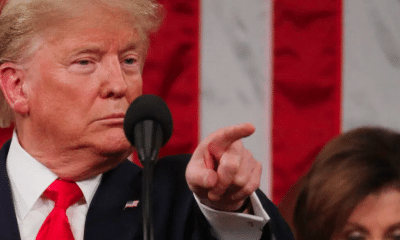Nigeria News
Trump Signs Federal Ban On ‘Revenge Porn’

United States President, Donald Trump, has signed into law the “Take It Down Act,” making it a federal offense to share intimate images without consent, including those produced through artificial intelligence.
The legislation, which received strong bipartisan backing in Congress, criminalises the non-consensual distribution of explicit content and obliges digital platforms to remove such content promptly.
“With the rise of AI image generation, countless women have been harassed with deepfakes and other explicit images distributed against their will,” Trump said during a signing event held in the White House Rose Garden.
“And today we’re making it totally illegal,” the president added. “Anyone who intentionally distributes explicit images without the subject’s consent will face up to three years in prison.”
Trump also noted that online platforms failing to delete the content within 48 hours of notification would face civil penalties.
First Lady Melania Trump, who had previously expressed support for the bill in March, attended the ceremony in a rare public appearance. Since the president took office on January 20, she has kept a relatively low profile in Washington.
Describing the law as a significant step, the First Lady remarked, “This legislation is a powerful step forward in our efforts to ensure that every American, especially young people, can feel better protected from their image or identity being abused.”
She also hailed it as a “national victory that will help parents and families protect children from online exploitation.”
The issue of deepfakes—digitally manipulated videos or images that appear convincingly real—has raised serious concerns, particularly around their misuse in spreading non-consensual pornographic material.
While some states like Florida and California already penalise the publication of sexually explicit deepfakes, civil liberties advocates have raised red flags over the broader implications of the federal bill.
The Electronic Frontier Foundation, a nonprofit advocating for digital rights, warned that the legislation may hand excessive censorship authority to powerful individuals, stating that it offers “the powerful a dangerous new route to manipulate platforms into removing lawful speech that they simply don’t like.”
Under the new law, digital platforms and social media sites are now obligated to establish rapid response systems to take down intimate content shared without permission once a victim files a complaint.










